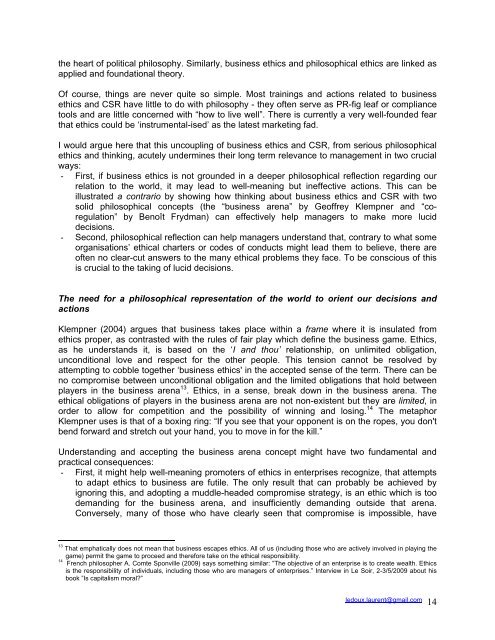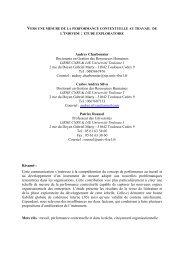Philosophy: The Managers - Philosophie Management
Philosophy: The Managers - Philosophie Management
Philosophy: The Managers - Philosophie Management
Create successful ePaper yourself
Turn your PDF publications into a flip-book with our unique Google optimized e-Paper software.
the heart of political philosophy. Similarly, business ethics and philosophical ethics are linked as<br />
applied and foundational theory.<br />
Of course, things are never quite so simple. Most trainings and actions related to business<br />
ethics and CSR have little to do with philosophy - they often serve as PR-fig leaf or compliance<br />
tools and are little concerned with “how to live well”. <strong>The</strong>re is currently a very well-founded fear<br />
that ethics could be ‘instrumental-ised’ as the latest marketing fad.<br />
I would argue here that this uncoupling of business ethics and CSR, from serious philosophical<br />
ethics and thinking, acutely undermines their long term relevance to management in two crucial<br />
ways:<br />
- First, if business ethics is not grounded in a deeper philosophical reflection regarding our<br />
relation to the world, it may lead to well-meaning but ineffective actions. This can be<br />
illustrated a contrario by showing how thinking about business ethics and CSR with two<br />
solid philosophical concepts (the “business arena” by Geoffrey Klempner and “coregulation”<br />
by Benoît Frydman) can effectively help managers to make more lucid<br />
decisions.<br />
- Second, philosophical reflection can help managers understand that, contrary to what some<br />
organisations’ ethical charters or codes of conducts might lead them to believe, there are<br />
often no clear-cut answers to the many ethical problems they face. To be conscious of this<br />
is crucial to the taking of lucid decisions.<br />
<strong>The</strong> need for a philosophical representation of the world to orient our decisions and<br />
actions<br />
Klempner (2004) argues that business takes place within a frame where it is insulated from<br />
ethics proper, as contrasted with the rules of fair play which define the business game. Ethics,<br />
as he understands it, is based on the ‘I and thou’ relationship, on unlimited obligation,<br />
unconditional love and respect for the other people. This tension cannot be resolved by<br />
attempting to cobble together ‘business ethics' in the accepted sense of the term. <strong>The</strong>re can be<br />
no compromise between unconditional obligation and the limited obligations that hold between<br />
players in the business arena 13 . Ethics, in a sense, break down in the business arena. <strong>The</strong><br />
ethical obligations of players in the business arena are not non-existent but they are limited, in<br />
order to allow for competition and the possibility of winning and losing. 14 <strong>The</strong> metaphor<br />
Klempner uses is that of a boxing ring: “If you see that your opponent is on the ropes, you don't<br />
bend forward and stretch out your hand, you to move in for the kill.”<br />
Understanding and accepting the business arena concept might have two fundamental and<br />
practical consequences:<br />
- First, it might help well-meaning promoters of ethics in enterprises recognize, that attempts<br />
to adapt ethics to business are futile. <strong>The</strong> only result that can probably be achieved by<br />
ignoring this, and adopting a muddle-headed compromise strategy, is an ethic which is too<br />
demanding for the business arena, and insufficiently demanding outside that arena.<br />
Conversely, many of those who have clearly seen that compromise is impossible, have<br />
13<br />
That emphatically does not mean that business escapes ethics. All of us (including those who are actively involved in playing the<br />
game) permit the game to proceed and therefore take on the ethical responsibility.<br />
14<br />
French philosopher A. Comte Sponville (2009) says something similar: ”<strong>The</strong> objective of an enterprise is to create wealth. Ethics<br />
is the responsibility of individuals, including those who are managers of enterprises.” Interview in Le Soir, 2-3/5/2009 about his<br />
book ”Is capitalism moral?”<br />
ledoux.laurent@gmail.com<br />
14
















